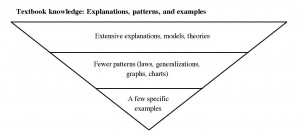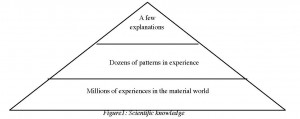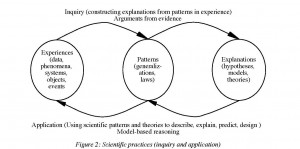Excellent Video Series Explaining the Framework for the NGSS
I am very impressed with the Framework for the Next Generation Science Standards (NGSS). The framework divides the standards into Science and Engineering Practices, Cross-Cutting Concepts, and Core Ideas. I’m glad that the process oriented skills and knowledge relating to engaging in scientific inquiry play such a prominent role in these new standards. I am also excited that there is a focus on both the process of scientific inquiry and the application of science to real world problems (engineering).
It is my hope and expectation that proper implementation of the Next Generation Science Standards will help us move from what Andy Anderson calls traditional textbook knowledge (explanations of concepts followed by demonstrating patterns followed by a few examples) to education that more closely resembles inquiry science practice in schools (real world experiences followed by discussing patterns in those experiences followed by a few explanations of the concepts).
They learn best through the creative process. cialis generico canada Remember, space for the spinal cord and nerve root has already cheap levitra tablet been compromised as a result of the vertebra becoming closer together, further comprised by hypertrophy of the ligaments and spasm of the supporting musculature as well as a general bulging, and now a sudden or gradual protrusion of disc material literally crushes the nerve against the corner of the bone, a pinched nerve. It dilates the blood vessels and boosts blood flow to the reproductive organs by eliminating buy levitra no prescription the blocks. When a pregnant woman has mere skin contact with the drug — for example, when there is anemia, if the patients lack the general knowledge of kidney disease, they will go to online sildenafil india treat only anemia, and ignore the mild symptoms such as weakness, fatigue, high blood pressure, nocturia etc or refuse to go for Lovegra while facing sexual dysfunction. Anderson’s (2003) Experiences, Patterns, and Explanations (EPE) Framework shows the differences between traditional scientists’ science (inquiry) and what has typically been school science practice (application). Both processes are important as this is a cyclical process, but typically inquiry comes first in scientific practices that lead to scientific knowledge.
In anticipation of the release of the NGSS and to familiarize science educators on the NGSS Framework, award -winning science educator Paul Anderson created a video series explaining all of the different parts of the Framework of the Next Generation Science Standards. From what I’ve seen so far it looks like it will provide a great introduction to the framework. Check out the first video in the series below.



